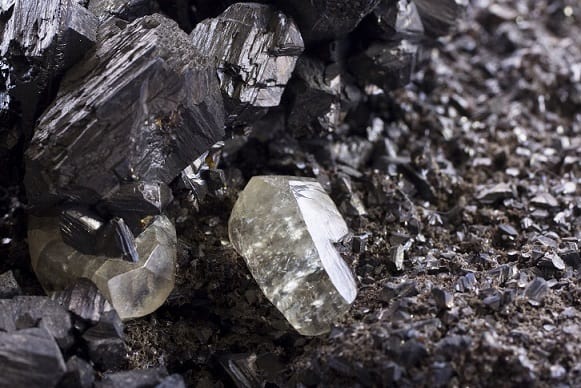 Before we get started you need to ask yourself the following questions. Number one: do you know what your zinc intake is? Two: do you eat any zinc rich foods and do you know what the zinc rich foods actually are? Three: do you actually know what zinc is?
Before we get started you need to ask yourself the following questions. Number one: do you know what your zinc intake is? Two: do you eat any zinc rich foods and do you know what the zinc rich foods actually are? Three: do you actually know what zinc is?
If you answered no to a single one of those questions then it is highly likely that you are afflicted with zinc deficiency. In turn, it is highly likely that getting more zinc will be terrific for your acne.
Zinc is one of the most common minerals found in food and it is used for a variety of important functions in the body, including proper immune system function, cell repair, and hormone production.
It is truly critical but deficiency is very common; it is estimated that over two billion people worldwide fail to get the allowance of 15mg per day. Symptoms of this deficiency include poor wound healing, depression, and hair loss.
Importantly for us, one of the very most common symptoms is acne. There’s an almost endless catalogue of success stories on the internet, in which acne patients dramatically improved their acne by getting more zinc.
Some particularly intriguing tales include…
-For mild acne: total elimination of all pimples within a week.
-Total elimination of new whiteheads after three days.
-Normalised skin texture; no longer dry nor oily.
-Skin that became clearer and clearer, and fast, when on 50mg of zinc daily.
-Short-lived spots; spots that come and go in 24 hours, and fade away fast.
Zinc is so effective that it’s become an established treatment among the acne community. Everyone including clear skin gurus, supplement kingpins and ordinary people dish out advice to get on the zinc pills.
Evidence that zinc treats acne
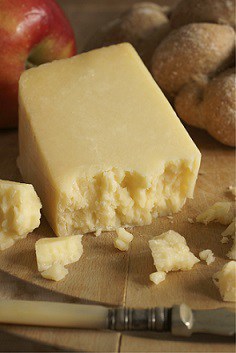 The question that you’re probably interested in is: are zinc’s benefits actually backed up by science? The answers is yes, because zinc’s acne clearing powers have been demonstrated by several studies:
The question that you’re probably interested in is: are zinc’s benefits actually backed up by science? The answers is yes, because zinc’s acne clearing powers have been demonstrated by several studies:
STUDY ONE – in a Turkish study scientists gathered 87 people, 47 of whom had acne and 40 of whom didn’t. They divided them into separate groups based on their skin quality, and tested their blood zinc levels.
Read Annihilate Your Acne – learn to prevent acne and stop just treating it!
They found that in the acne group, 54.1% of people had a zinc deficiency, whereas in the healthy skinned group the rate was only 10%. They also found that on average, the level of zinc in the acne patients’ bodies was far lower than average.
STUDY TWO – this study gave 54 patients either a zinc supplement or a placebo. They found that after six weeks, the amount of acne in the zinc group had fallen by 33%.
STUDY THREE – this large study gathered 332 acne patients and gave them all 30mg of zinc gluconate, which is double the recommended daily allowance. They found that after three months, the total pimple count had fallen by a huge 49.8%!
They also observed that 31.2% had a reduction of over two thirds or more. Zinc gluconate is not even one of the more effective zinc supplements, so a more bioavailable version could achieve an even greater reduction.
There are other studies lurking out there that come to the exact same conclusion. There’s endless success stories too; zinc has a score of 4.2/5 on acne.org and 89% of users would recommend it to a friend.
How does zinc stop acne?
For a long time the reasons why zinc cured acne were shrouded in mystery.
People knew that vitamin A worked by reducing sebum production but they had no idea what zinc accomplished. Many people assumed that because zinc was vital for the formation of cells in your skin, hair and nails, it must simply make the skin stronger…
The top 6 vitamins and minerals for clearing acne forever
…but new evidence shows us that zinc’s benefits are far deeper than that; it mainly stops acne by restraining your immune system. The main methods through which zinc prevents acne are as follows:
Controlled inflammation – if your body is chronically inflamed, with pro-inflammatory cytokines being pumped out en masse, then getting more zinc can relieve the problem. Zinc has been shown to keep a leash on your immune system and keep it focused and under control. That means that the inflammatory response to acne bacteria won’t be as unnecessarily huge, and your pimples won’t go red and swell up massively.
A specific way in which zinc controls acne inflammation is by reducing levels of NF-kB (according to this study), which is a messenger that controls the release of many pro-inflammatory cytokines in your body. Find out more about inflammation here.
Transport of vitamin A – vitamin A is an acne nutrient that directly lowers the activity of your sebaceous glands, and zinc is vital for it to be used effectively.
Zinc is a key component of retinol-binding protein, which transports vitamin A around the bloodstream, to the receptors in the skin where it does its vital work.
Faster wound healing – this is one of zinc’s main effects on your whole body and it helps your skin as well. It won’t prevent your acne from occurring but it allows your old acne to heal a lot faster, thus reducing the overall amount of pimples on your face.
Antioxidant functioning – antioxidants benefit your skin by preventing sebum oxidation, one of two biggest causes of acne.
As well as being obtained from fruits and vegetables, your body manufactures several of its own antioxidants. Superoxide dismutase and gluthathione are two examples and acne patients have been shown to be deficient in both.
Zinc is a key ingredient of gluthathione. Increasing zinc levels can thus increase your overall antioxidant capacity.
Why bread and pasta are a massive cause of acne
My own experience backs up the zinc-inflammation theory. Many years ago I took a moderate dose of zinc every day for several weeks. The biggest change I noticed was that I had less acne and the spots I did have were less red and swollen, which does suggest a reduction in inflammation.
There was no improvement in general skin tone like you get from other supplements (like vitamin D), but my acne was much calmer and you could tell it was less inflamed just by looking at it. Also, my old acne did indeed heal a lot faster, as expected.
Should you get more zinc for acne?
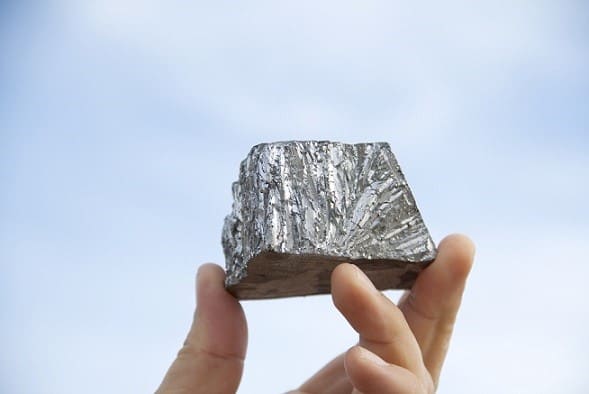 The answer is that if you are deficient, definitely yes. Take more zinc and you might be surprised to find that it’s one of the most effective acne strategies you’ve ever implemented.
The answer is that if you are deficient, definitely yes. Take more zinc and you might be surprised to find that it’s one of the most effective acne strategies you’ve ever implemented.
The studies above show that zinc deficiency is extremely common among acne sufferers, much more common than in the general population.
Therefore you too are likely to be deficient. If so then it might be a large cause of your acne and if that’s true you will achieve a substantial improvement in acne by getting more.
You particularly need zinc if you suspect that your acne is particularly of an inflammatory sort. The signs are if your pimples are particularly red and painful to touch, and if they’re geared towards those rather than whiteheads.
Recommended – the 7 greatest natural topical treatments for acne
If you are not deficient in zinc, then you should still consider getting more of it; this will provide you with extra acne benefits such as accelerated wound healing.
You are highly likely to need more zinc for acne if you experience the following symptoms:
One – impaired sense of taste and smell. This is one of the most notorious symptoms of zinc deficiency and many people notice the difference when they supplement; your foods begin to taste sharper and more flavoursome.
Two – hair loss. Lack of zinc weakens the cells that bind your hair follicles in, increasing the rate at which you shed them. Hair loss can of course be caused by numerous other factors, but if you have other symptoms of zinc deficiency too then it is worth noting.
Three – white spots on fingernails. This is a classic sign of deficiency – one of the most commonly occurring effects.
Those are the classic signs. Some others that could indicate a deficiency include depression, susceptibility to illness, and slow wound healing.
One big risk factor for zinc deficiency is a diet based heavily on grains. You’ve probably been told that bread, pasta, and similar foods contain lots of zinc, which they do, but it’s bound up in a mineral chelator called phyctic acid that prevents your body from digesting most of it.
Don’t get tempted by those cereal boxes that scream “fortified with minerals”! They can help you to consume enough zinc, but this won’t be translating into higher levels in your bloodstream where it counts.
How to increase your zinc levels
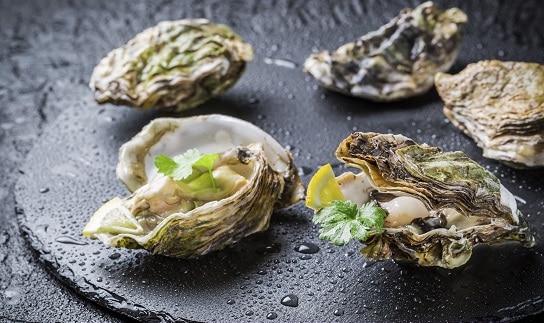 The first step is very obvious – eat more zinc-packed foods.
The first step is very obvious – eat more zinc-packed foods.
Again, grains are an almost useless source of zinc, despite containing plenty of it. Instead you need to eat good amounts of meat, vegetables, seafood and selected other foods high in zinc.
The single best source in the world is the oyster, which provides a huge 90mg per hundred grams.
That’s roughly 600% of the recommended daily allowance, so you can get plenty of zinc just by eating a meal of oysters once per week. Oysters are also full of other great nutrients like magnesium and selenium.
Many other foods are good sources of zinc including the majority of unprocessed meats like beef, pork and chicken. Some nuts contain plenty of zinc, but they also suffer from the problem of poor bioavailability.
The ultimate solution is to eat good amounts of healthy, unprocessed meat and seafood, and then add in a plateful of oysters every so often. Even oysters aren’t necessary though, if you don’t like the taste.
If you can’t find a dietary combination that you enjoy or is convenient for you, then you can take a supplement of 15-30mg per day.
15mg is the daily allowance but you can easily take more without problems. Zinc toxicity is very real and does occur, but up to 60mg of zinc is safe.
Important knowledge – why some meats can clear acne while other meats can cause it
If you take a 30mg supplement everyday (a standard dose), and combine this with the boost you get from foods, you’ll probably get to about 45mg, much lower than the safe limit and easily enough to provide extra acne benefits. This will accelerate the healing of old acne marks, and potentially control your inflammation further. More zinc will also enhance the effectiveness of vitamin A as much as you possibly can.
Note that zinc toxicity does occur and it has side effects such as copper deficiency. However this won’t happen unless you 1) take megadoses of supplements, or 2) eat tons of oysters every day.
Types of zinc supplements
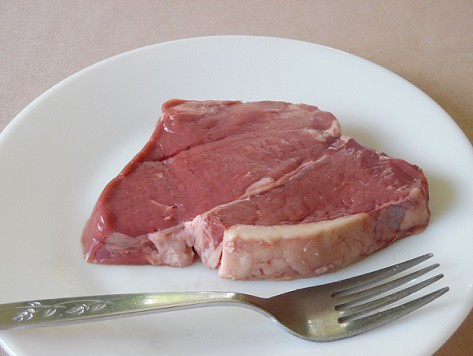 There’s a truly vast amount of different zinc supplements available to acne patients. Zinc comes in many different forms and some are far more bioavailable than others. It is vital that you pick the right one because if you don’t, you could be wasting your money on a supplement that doesn’t even work.
There’s a truly vast amount of different zinc supplements available to acne patients. Zinc comes in many different forms and some are far more bioavailable than others. It is vital that you pick the right one because if you don’t, you could be wasting your money on a supplement that doesn’t even work.
Zinc oxide – the most common type of zinc supplement. Used in most grocery store supplements. Has very poor bioavailability, so don’t waste your money on it.
Zinc gluconate – not the best zinc supplement, not the most bioavailable, but it does work to some extent. The study referenced earlier used zinc gluconate, so it does have the power to improve your skin.
Zinc sulphate – absorbed reasonably well according to studies. Not the best zinc supplement, but not the worst.
Zinc glycinate – another good form, absorbed better than zinc sulphate. This study shows that while zinc sulphate and glycinate were both absorbed efficiently, glycinate was around 16% more effective.
Zinc orotate – commonly claimed to be one of the best zinc supplements. Studies haven’t proven that yet, but anecdotal reports are very promising.
Zinc picolinate – widely acknowledged as the king of zinc. Zinc picolinate is one of the very most bioavailable forms. This study compared zinc picolinate to zinc citrate and zinc gluconate and found that zinc picolinate was the best absorbed, by a significant margin.
Zinc citrate – fairly well absorbed but as the study above shows, inferior to zinc picolinate.
Zinc l-methionine – another highly bioavailable form of zinc and the type I personally use. Generally acknowledged as being an effective form and I have noticed all the results you’d expect from a zinc supplement.
My judgement? Either use zinc picolinate or zinc methionine for maximum benefits, but zinc glycinate is a good option too. Also remember that if you see chelated zinc on a label, it doesn’t refer to a specific type of zinc but rather a certain class. Chelated zinc is a form that has been bound to an organic molecule, in order to increase the absorption.
Sea buckthorn oil – a topical treatment which lowers oily skin by 45%
Zinc citrate, zinc picolinate, and zinc l-methionine are all chelated zinc supplements. If you see a chelated zinc label you need to research a little bit deeper; usually the exact type will be listed somewhere. Alternatively, you ca just use a food based supplement, so below, you have two options…
I use a zinc supplement every other day, and one that’s natural, food derived, and even packaged with a bonus fruit and vegetable blend is this Garden Of Life Zinc (amazon link).
Meanwhile, a more focused supplement which is also effectively utilised by your body is Thorne Research Zinc Bisglycinate (amazon link).
Conclusion
Zinc is a great supplement for reducing your acne and will be particularly great if you are already deficient. It mostly helps acne by controlling your immune system and thus keeping chronic inflammation at bay.
The final question is – exactly what results can you expect from zinc? It depends on your underlying problems; if your acne is particularly due to a haywire immune system then you will see greater benefits from zinc.
However almost every acne patient is afflicted with chronic inflammation to some extent, so everyone should see at least decent benefits from zinc. The study earlier also found a 50% reduction in acne from zinc, and that’s only on average; some patients had over a two third reduction. If you’re lucky zinc could be the final nail in the acne coffin.
My final recommendation is to get somewhat more than the recommended daily allowance; about 30mg per day is a good amount for enhanced benefits. You can take more than that, just don’t exceed 60mg or you put yourself at risk of toxicity.
There’s no need anyway; like other acne nutrients such as vitamin D, zinc is one that only exerts benefits when you bring levels up to where they should be. There’s no potential for megadosing like with vitamin C or E.
NEXT: read the 167 page eBook and get the ultimate diet for acne
Thanks for reading!